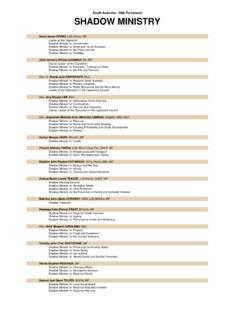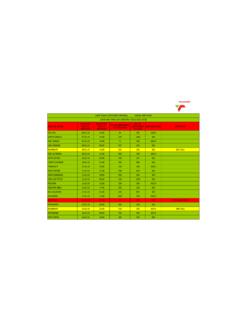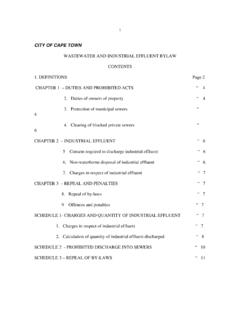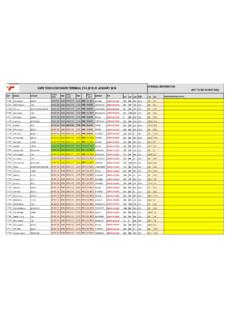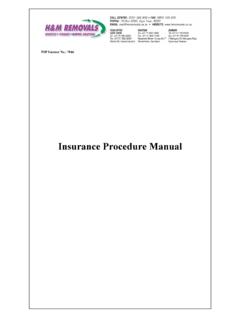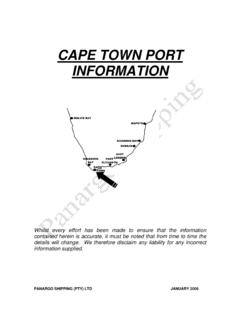Transcription of TRAVEL REPORT by Hon Robert Lawson QC MLC of travel …
1 TRAVEL REPORT by Hon Robert Lawson QC MLC of TRAVEL to cape town , South Africa 29 May 7 June 2005 2. This TRAVEL REPORT is submitted pursuant to the provisions of the Members TRAVEL Entitlement Rules of the South Australian Parliament. I travelled by air from Adelaide to cape town on 29 May 2005 where, apart from a short visit to the Paarl/Stellenbosch region north of the city (described below), I remained until my return to Australia on 7 June. The purpose and objectives of the TRAVEL The purpose of the TRAVEL was to attend the 17th Commonwealth Parliamentary Seminar as representative and delegate of the South Australian branch of the Commonwealth Parliamentary Association (the CPA). The theme of the Seminar was Strengthening Parliament . It was held at the National Parliament of the Republic of South Africa and was formally hosted by that Parliament. The detailed program of the Seminar is attached to, and forms part of, this REPORT .
2 The Seminar was attended by delegates from 24 Parliaments in 19 countries. Its function was to promote knowledge and understanding about Parliamentary democracy within the Commonwealth of Nations. The Seminar examined such issues as: Ethics and accountability Parliamentary committee systems REPORT3. The relationship between Parliament, the Executive and the public service The relationship between Parliament and the community. The theme of the Seminar was admirably summarised in an opening address given by Mr Johannes Mninwa Mahlangu MP, Chairperson of the National Council of Provinces of South Africa, a copy of which is an attachment to this paper. In addition to attending and participating in each of the formal sessions of the Seminar, at the invitation of the organisers, I wrote and presented a paper entitled Financial Responsibility in the Democratic Process. Modesty prevents me from describing the paper, a copy of which is also attached, as a highlight of the Seminar!
3 The cost of the Seminar and accommodation for its duration was met by the South African branch of the CPA. I was accompanied by my wife. Our airfares and other expenses were met from any Parliamentary TRAVEL entitlement. This REPORT includes the following Attachments: A Paper presented by the writer B Seminar program C List of Seminar participants D Opening Address E Seminar handbook. REPORT The form of democratic government which we have in Australia is not enjoyed in all Commonwealth countries and one of the functions of CPA Seminars is to provide a forum for an exchange of ideas and information with a view to improving institutions everywhere. The economic conditions and political 4. situation in many countries are not as comfortable or as stable as they are in Australia and sensitivity to differing circumstances is required by delegates. Moreover, much of the discussion comprised explanations of local conditions and situations which are not of permanent interest.
4 The Seminar was essentially interactive with each pre-determined topic being introduced by delegates followed by an open discussion. During the discussions, delegates usually described the manner in which the particular issue is addressed in their jurisdiction. Although proceedings were recorded, at the time of writing this REPORT , the transcript is not available. It would be neither helpful nor productive for me to summarise the discussions. The topics listed in the program provide a self-evident summary of the essence of the discussions. The following section of my REPORT comprises general comments arising from my discussions and observations during and after my attendance at the Seminar. The political landscape The host nation, South Africa, is at an interesting stage in its political development. The inspiring personality, statements and philosophy of Nelson Mandela are all-pervading: in speeches in the Parliament, in general political discourse outside of Parliament and in the media.
5 On billboards and especially in the townships, he is the subject of admiration, pride and affection. Although Mandela is no longer intimately involved in the day to day government, his name is almost invariably invoked in every conversation. If ever the spirit of a nation was reflected in one man, he is that man. 5. cape town is the legislative centre of South Africa and the Parliament (comprising the National Assembly and the National Council of Provinces) is located there. Although bi-cameral in structure, the functions of the two houses are unique to South Africa. Under the Constitution adopted at the end of 1996 (ie, almost 2 years after the Freedom Day, 27 April 1994) the National Council of Provinces, comprising 90 members (10 from each of the nine provincial legislatures) has the function of protecting regional interests and safeguarding cultural and linguistic traditions among ethnic minorities. The National Assembly (comprising 400 members elected for 5-year terms under a system of proportional representation) elects the President who is Chief of State and Head of Government.
6 President Thabo Mbeki has held this post since Mandela retired in 1999. The government is a coalition of the African National Congress ( ANC ) (279 seats) and the Inkatha Freedom Party (28 seats). The ANC is the predominant political force. The Democratic Alliance (50 seats) is the main opposition party. The major political issues in South Africa are unemployment ( ), poverty (50% of the population live below the poverty line ) and housing. In a more general sense, the greatest political challenge is managing the expectations of the bulk of the population who had high hopes that the end of apartheid and the introduction of black majority rule would transform their lives. Progress has not been as rapid as was anticipated and the continuation of the disparity of the distribution of wealth is everywhere in evidence. The low wage structure and heavily deflated value of the Rand means that trade opportunities between South Africa and Australia are likely to favour the former in the short term.
7 In-bound tourism (especially from Europe which enjoys a common time zone) is a major South African industry. One obvious impediment to tourism is the security situation. Johannesburg is notorious for its danger. Notwithstanding that cape town is said to be relatively safe, barbed wire, heavy security 6. precautions and armed guards are both conspicuous and ever-present in the city. All international delegates at the Seminar were housed in the Holiday Inn in downtown cape town within a 10-minute walk of the Parliament precinct. It is a measure of the security situation in cape town that delegates were strongly advised to make the journey by bus. Notwithstanding this injunction, I did walk between these places on some occasions without incident, although not without some trepidation. Visits On thee Thursday of the Seminar, as part of the formal program, delegates were taken to the metropolitan suburbs of Khayelitsha and Langa. To visit these vast shanty towns (Khayelitsha has a population of 1 million people!)
8 Is a depressing experience. While there was some evidence of new housing construction, the enormity of the task of rehousing people is daunting. Although the delegation was escorted by a vigilant contingent of 8 police officers, we were able to converse freely with those residents who came forward. We visited the Chris Hani Independent School in the Joe Slovo Squatter Camp at Langa. This privately-funded R-7 school describes itself as a transitional school for children of all races aged 6-16, whose parents have come to cape town searching for work. Most attendees have not had prior opportunities to attend public school. The aim of the school is to transform its students into school-ready applicants who can be enrolled in state-supported schools . The school has 750 students. Its facilities comprise several classrooms made from shipping containers. In one class, there were 60 children crammed into one container. There is no school yard. The containers form a single line of buildings along a disused transport corridor within 3 metres of the adjoining shanty dwellings.
9 7. Despite the squalor of their surroundings, the spirit of the students was inspiring. This was evidenced by their welcoming greetings (all said in unison), their songs and their enthusiastic participation in lessons. They were quite amazing. It was not surprising to learn that an earlier visit had so moved the American talk show host, Oprah Winfrey, that she has committed millions to building a proper school for them. The Principal, Ms Maureen Jacobs, and her volunteer staff are exceptional people. In one sense, the Chris Hani Independent School epitomises black South Africa - idealism and optimism in spite of poverty, dislocation and despair. A proposed visit to Robbern Island could not proceed because of sea conditions. This island is the site of Nelson Mandela s imprisonment for 26 years. It is a shrine to him and a reminder of the brutality of apartheid. However, elsewhere there was no shortage of reminders of these matters. District Six We were taken to the area close to the centre of cape town known as District Six.
10 Over 60,000 coloured people occupied the area in 1966 when a declaration was made by the apartheid government under the infamous Group Areas Act. The area was declared a white area and the inhabitants were forcibly removed and their houses flattened by bulldozers. As a result of fierce opposition and protests, the area was never re-settled and remains vacant in the midst of this large city. The waterfront We visited the waterfront development which is a massive, mixed retail, entertainment and residential development. The centrepiece is the V8A Waterfront shopping centre, a large enclosed mall. The area appeared to be well-patronised by tourists and mainly white South Africans. Its location on the coast within a kilometre of the city centre and with Table Mountain in the 8. background is spectacular. Whether the comparable development proposed for Port Adelaide will achieve the same popularity and prestige remains to be seen. Judicial independence During the week of the Seminar, the major political event in South Africa was the judgment handed down in the High Court in Durban by Justice Hilary Squires in the trial on corruption charges of Schabir Shaik.

